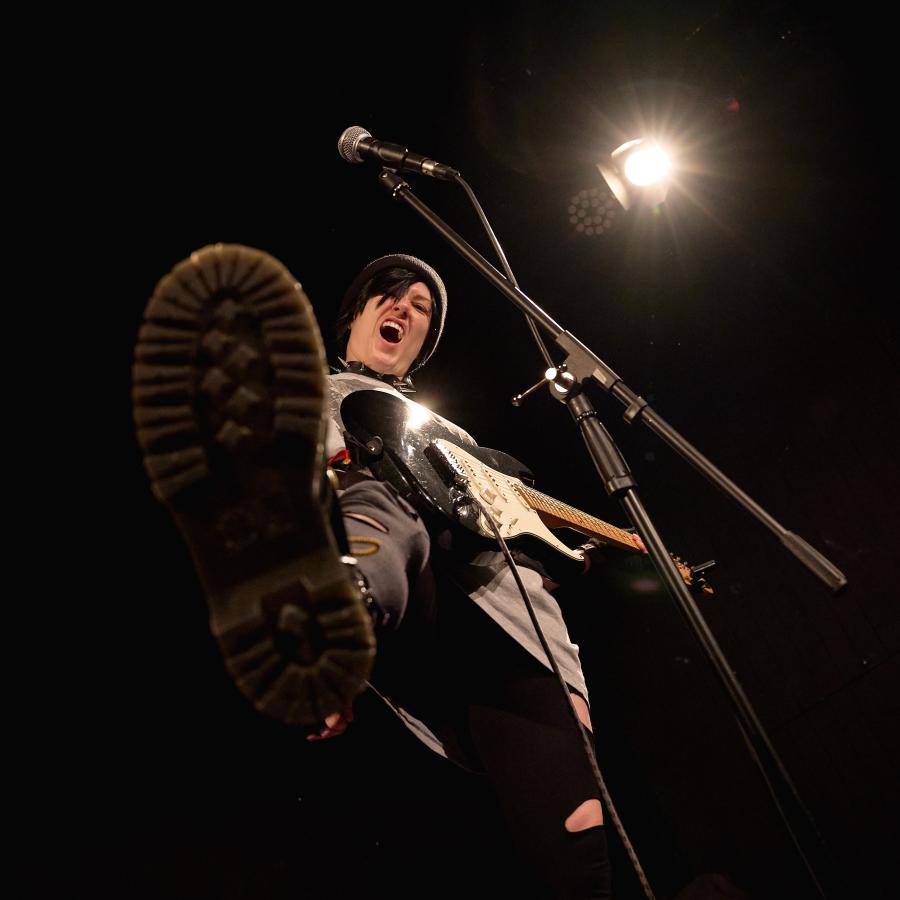In the vibrant world of theatre, there's a special kind of performance that often goes unnoticed by the general public but is cherished by artists and dedicated theatre-goers alike: the work-in-progress (WIP). As Camden People's Theatre begins its Autumn 2024 season, we're pulling back the curtain on these unique shows and inviting you to be part of the creative process.
What Exactly is a Work-in-Progress?
At first glance, you might think a WIP is simply an unfinished show. Okay, well that's partially true. But a WIP is also so much more. Laurie Stevens, whose show Sticky Floors was developed on CPT's Starting Blocks programme, offers a delicious analogy: "Like cookie dough and a cookie – they have stuff in common but are distinctly different tasty treats!"
Isabella Leung, presenting Ancestral Time Travel Agency alongside Louiseanne Wong, provides another perspective: "We don't think so - it's more like a show that is forming. The reason we do WIPs is to test some concepts and ideas so that the 'value' becomes more valuable. We're inviting the audience and their perspective to help us cultivate the finished product."
Jenny Witzel and Calum Perrin, the creative duo behind I, Symbiont & Untitled view WIPs as "early versions of a show. And each version is wonderful in its own way. Just because the show changes (and hopefully gets better!) doesn't mean previous versions aren't worth the money." They reckon:
"While all theatre is about the relationship between performers/makers and audience members, I feel WIPs are especially symbiotic (wink wink nudge nudge). While I always make sure to invite friends in the biz whose opinion I trust, feedback from strangers who don't know my work is invaluable. As a general rule for seeing theatre I'd recommend not giving feedback unless asked, but with a WIP I'd suggest: say more!"
Doug Crossley, creator of No More Mr Nice Gay, emphasises the deliberate nature of WIPs:
"For me, a work in progress is like a preview of a new show. I work it and rehearse it as hard as I would the final production. The difference being that there some elements might be unique to this showing. So, yes, it's unfinished, but it's very deliberately that way. It's special. I think we've lost a lot of willingness to invest in experimentation, and for me, a WIP is about embracing the messiness of the process."
The Audience's Role: More Than Just Spectators
What sets a WIP apart from a traditional performance is the crucial role the audience plays. Fraser Kelsey (Desperate Wee Gay Boy) describes it beautifully: "It's an experiment, the theatre being the laboratory and the audience the lab assistance." He explains:
"A work in progress, or a WIP, is to explore and showcase SOMETHING. It can be anything, a flavor or an essence of a piece, to give it space to allow it to be and potentially grow. It's an experiment, the theatre being the laboratory and the audience the lab assistance. Audience feedback is crucial from this perspective as they see what the performer and creatives don't: the SOMETHING being revealed for the first time and landing in that space."
Leung emphasizes the unique perspective audiences get: "The raw ideas, the chance to meet the process, a stripped back version of a full show, a chance to see new things. If they enjoy watching the sprouting of a plant instead of a full grown tree, they should see a WIP."
Laurie elaborates on this idea: "In a WIP, the audience are essentially extra directors! If you like something, we can feel it, and it stays. If you're bored/it's not funny, similarly, we can *really* feel it, and we change the show accordingly." She adds:
"Not only will you experience something one-of-a-kind, but you get the gratification of knowing your input is shaping the show. Every WIP an artist does is different, but also the way artists present their WIPs is really varied – they're a chance to see how an artist thinks. Some will be script-in-hand; others will be extremely polished. Some will have a clearly-defined narrative but will be working on the staging of the show; others will have a very clear atmosphere but the narrative will be looser."
This collaborative aspect creates a unique experience for audience members. As Witzel and Perrin put it, "WIPs are a super special sneak peek into the business of performance making where your presence (and input, if you like) plays a big role in shaping the final show."
The Value for Artists
For artists, WIPs are an invaluable part of the creative process. Isobel Jacob and Floran Lim from Burning Attic Theatre Company explain: "As artists creating live performance, there is a lot we can only find out by performing the work in front of an audience, and seeing how it is perceived and interacted with." They elaborate:
"Our aim for the WIP of Why Dirty Dancing is My Favourite Film is to test how the themes and dramaturgical structure is received, and to explore the best mode of storytelling for a piece about such a broad but barely represented subject matter. As there is such limited asexual representation in theatre, and funding is so hard to obtain, doing a WIP gives us the chance to prove our ideas and approach to get the interest for further development. It can motivate us to bring the work to a certain stage of development, and create the opportunity to test material in front of an audience, without the pressure of needing fully-realised costumes / set design / the full length of a 1.5 hour show."
Leung adds another perspective on the value for artists: "It helps us to make artistic decisions. There is also less pressure for us because the audience isn't expecting a finished show. In the long run, a WIP is a great platform to invite programmers who are seeking new work like ours, and with their support, our piece can grow into a full production in the future."
Crossley adds a personal note: "I've struggled with lifelong confidence issues, and a WIP allows me to build the show slowly, with (a little bit) less of the financial or creative strain of needing to have everything perfect from the start. It's a chance to fail and learn, which is essential for growth." He continues:
"For me, the value is in the freedom to explore without the pressure of presenting a polished product. It's also a chance to have work dwell in the liminal and rare creative space before a reviewer comes in and criticises and boxes it into a star rating. Live with me for a while in the joy of a new creation before it is categorised forever!"
How Feedback Shapes the Show
The feedback process is at the heart of what makes WIPs so special. Stevens shares, "I read every feedback sheet in detail and use a lot of it in what I write!" This sentiment is echoed by Jacob and Lim, who note how audience feedback during their last WIP stage influenced them to "hone in entirely on a fantasy world, which changed the structure of the show." They add:
"Because we are collaboratively devising a play from scratch, there is so much scope for feedback to affect the direction of development. When making work for specific audiences - e.g. different queer communities - it is really useful to know whether they feel seen and represented in the work, and do more of the things that they like, and rethink anything that didn't speak to their experiences (as our teams can only really reflect their own!)."
Leung provides insight into how feedback can shape specific aspects of a show: "Audience feedback can inform the artists of the piece's impact and relevance. E.g. Do the jokes land? Are they surprised when XX appears? Their feedback can also inform if their experience is an individual experience or a collective experience. If more than one audience member feels that they connect to a moment in the story, then we could follow that moment to create a journey. For Ancestral Time Travel Agency, we want to test how our East Asian themes are read by the audience, thus their understanding of perspectives."
Crossley describes it as a real-time process: "You're witnessing how people respond in real-time. In my case, I use it to fine-tune the show, tweaking moments that land well or cutting bits that don't." He elaborates:
"For many years as an 'emerging' artist the only voice you receive in the development of your work is that of the development department of a big institution.It's often quite critical and dismissive. I want more than anything for this work to dialogue directly with the audience. I'll be giving you ways to talk directly to me: I make shows for audiences first and foremost."
Join the Creative Journey
In the words of Lyn Gardner, "British theatre would be completely stymied without tiny, under-resourced venues such as CPT, which are a critical part of the theatre ecology." By attending WIPs, you're not just watching theatre – you're helping to create it.
So as we dive into our Autumn 2024 season, we're introducing the new 'Mr Wippy' season pass, offering theatre enthusiasts the chance to immerse themselves in the world of WIPs. For just £30, you can attend as many work-in-progress performances as you like.
Are you ready to step into the lab and help shape the theatre of tomorrow? CPT - and the arists we support - hope so.
As Crossley puts it, "Audiences get to experience a big burst of new show energy. It's all the excitement, joy, and chaos that comes with developing a show. You can expect to find gems in a WIP that you will never find again. And, you get to say you were there at the start of the thing and that is a very special kind of exclusive bragging right."







